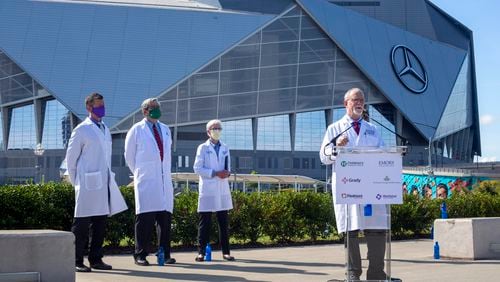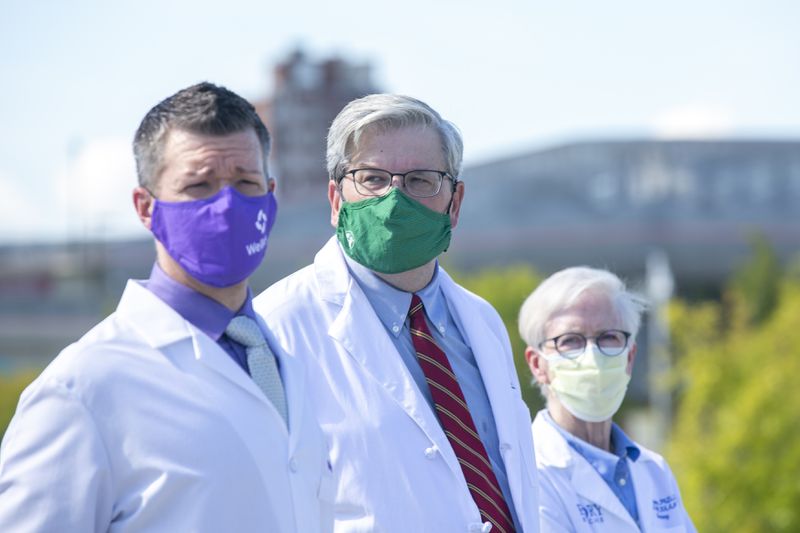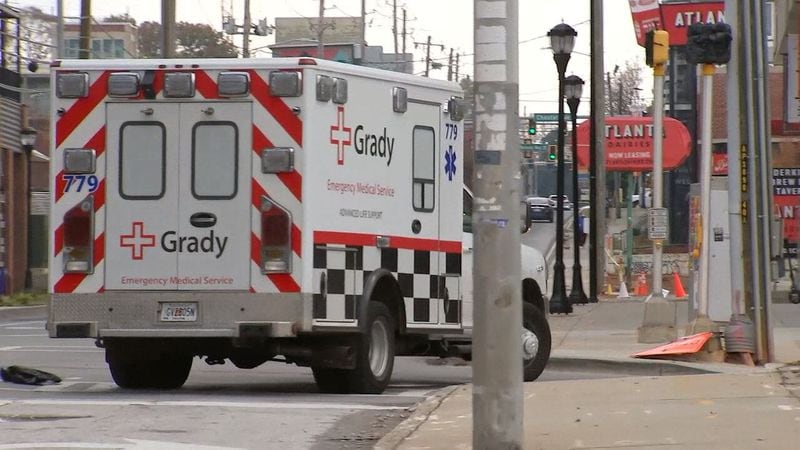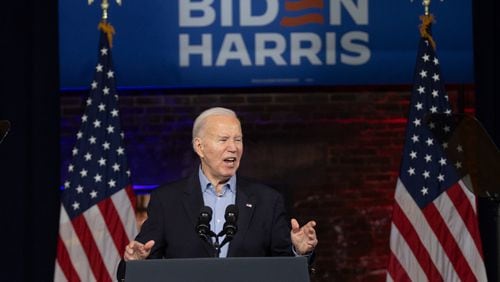Doctors and nurses from metro Atlanta’s major hospital systems all but begged Georgians Thursday morning to get vaccinated and take other steps to mitigate the spread of COVID-19, sharing stories of full emergency rooms and long wait times for patients needing care.
Hours later, Gov. Brian Kemp announced he had signed an executive order blocking cities from forcing private businesses to enact mask rules, mandate vaccines or take other actions to mitigate the coronavirus.
The back-to-back events showcased just how difficult it may be for the state to overcome a fourth wave of cases fueled by the highly contagious delta variant and low vaccination rates. There are currently 4,900 COVID-19 patients hospitalized in Georgia, but less than 47% of eligible residents were fully inoculated as of Wednesday, according to data from the U.S. Department of Health and Human Services.
In a press conference overlooking Mercedes-Benz Stadium, a mass vaccination site earlier this year, the half-dozen medical officials said hospital beds and ICUs across the region are filling up with coronavirus patients, the vast majority of whom are unvaccinated.
The sheer volume is making it hard to care for everyone quickly, they said, and has impacted people coming in with non-COVID ailments.
“Our emergency room, like so many, is overrun right now,” said Dr. Robert Jansen, chief medical officer of Grady Health System. “We have more patients in the emergency department waiting for care than at almost any other time. And this is seen at every hospital in the city and across the state.”
As of Thursday morning, more than 30% of all patients hospitalized in Georgia were confirmed or suspected COVID-19 patients.
Dr. Danny Branstetter, medical director of infection prevention at Wellstar Health System, said that 92% of patients hospitalized there are unvaccinated and that six in 10 ICU patients are unvaccinated people battling COVID-19.
The rate is even higher at Piedmont’s hospitals. Dr. Andy Jaffal, Piedmont Atlanta’s chief medical officer, said 97% of people in Piedmont’s ICUs are unvaccinated.
Credit: Rebecca Wright
Credit: Rebecca Wright
Kemp’s executive order, meanwhile, would give businesses the choice of whether to require vaccines, masks or limit capacity to reduce the spread of the virus. But the Republican said cities shouldn’t be able to enact ordinances that require companies to do so.
“There are some across the state who want to go back into lockdown mode,” Kemp told reporters at the state Capitol. “The fact is that small businesses across our state should not be punished by local governments just because they’re trying to make a living, pay their employees and save their livelihoods.”
Kemp has been under intense pressure from public health experts and Democrats in recent weeks to take new steps to curb the latest COVID outbreak. At the same, many conservatives aligned with former President Donald Trump, whom Kemp is seeking to win over as he runs for reelection next year, had been calling on Kemp to ban mask and vaccine mandates as Texas Gov. Greg Abbott did last month.
The medical professionals at Thursday’s event took care to avoid politics and instead focused on urging Georgians to get vaccinated, wash their hands and mask up, especially in schools and crowded places.
“The vaccine works,” Jansen said. “It’s very clear from the data that the vaccine protects you from getting infected, and if you do get infected, because it’s not 100%, it protects you from serious illness, and that’s what we’re seeing.”
COVID cases are increasing so quickly among the unvaccinated that Georgia hospitals are bracing for a flood of patients that could exceed the January peak, the worst of the pandemic. And they’re not expecting things to let up until well into September.
Some Georgia hospitals have already started pausing elective surgeries to preserve hospital beds and staff because of the flood of COVID-19 patients.
“Our current situation is untenable. By postponing elective cases, we will free up operating room resources to best serve our community in this time of desperate need,” said Dr. Jason Williams, director of perioperative services at Phoebe Putney Memorial Hospital in Albany.
Northeast Georgia Health System erected tents at its Gainesville and Braselton locations in order to add capacity to its emergency department, which was so crowded at points this week that doctors and nurses had to see patients in ambulances while they waited for space to open up inside the ER.
Statewide, 89% of ICU beds were occupied. Some hospitals had ICU beds open but didn’t have enough nurses to staff the beds.
A number of hospital systems, including Wellstar, have restricted visitors to cut down on the possibility that they could infect patients with COVID-19. And others are directing EMS to divert patients to other hospitals, if possible.
“We don’t have the luxury of saying we’re full and we’re closed. We’re not a hotel,” said Grady’s Jansen. “People will continue to come and our staff will continue to cope and find places to take care of these patients, but it is going to be difficult and … it won’t make people happy.”
All of those factors are taking their toll on the doctors, nurses and other staff that care for patients. Many are burnt out, and some are even leaving the medical profession, which is further stretching already strained hospitals, said Sharon Pappas, chief nurse executive at Emory Healthcare.
Nurses “want to take care of every patient who crosses our path,” Pappas said. “However, this surge in COVID is making it difficult to provide the most critical care to those in need: the children, the immunocompromised, patients who need treatment for acute and chronic conditions, as well as those who are gravely ill with COVID-19 and the delta variant.”
Staff writer Greg Bluestein contributed to this article.










